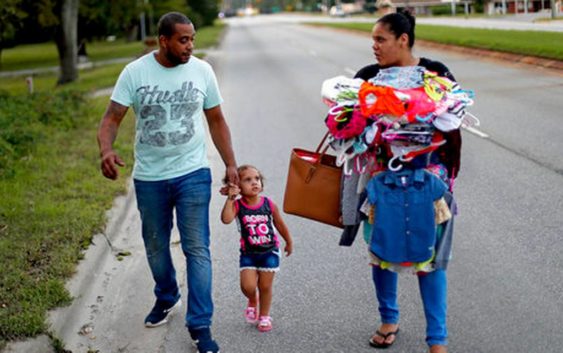- Southport hosts annual Hurricane Expo ahead of the 2024 season
- How to protect your car before a hailstorm
- ‘We lost everything’: East Texas residents confront their future after flooding
- Here's how to get your flooding debris picked up by the City of Houston
- Mosquito activity on the rise due to rainfall, flooding across Texas
Reckoning with loss of homes, livelihoods after Florence

With Florence’s floodwaters receding in some places and still menacing others, tired and waterlogged North Carolinians are finally getting a chance to take stock of the destruction from the wind and floodwaters.
When rivers spilled from their banks this week, many were forced to flee their homes in multiple inland cities. Now that waters are receding, property owners along its banks are picking through debris and figuring out what’s left of their homes and livelihood.
Jose Perez-Santiago, an Afghanistan war veteran, retrieved belongings on Wednesday from a Spring Lake house swamped by the overflowing Little River.
“I didn’t realize we would lose everything,” said Perez-Santiago. “We’ll just have to start from the bottom again.”
For some locals in Wilmington, a coastal city littered with downed trees and floodwaters, the storm offered the bittersweet bargain of nonstop, tiring work that comes with a paycheck for helping others.
Stanley Hall, 54, had to walk 4 miles (6 kilometers) to get to a downtown Wilmington hotel to join up with about 50 other locals doing temporary work for SERVPRO, which specializes in cleaning up water damage in homes and buildings.
Hall said he’s earning $12 an hour for the SERVPRO work, two dollars more than his temp agency normally pays. He’s also been working about double a normal week’s worth of hours — meaning plenty of overtime pay.
“I ain’t mad about that, that’s for sure,” he said.
Inland in Lumberton, which was hard hit by flooding from the Lumber River, Wavon Rogers spent several days after the storm as a civilian volunteer using his boat and truck ferrying 18 people either away from flooded homes, or back to retrieve medicine and essential belongings.
With the sun out and some Lumberton roads drying, he’s shifting back to his day job as an electrical contractor, helping homeowners restore power or hook up generators. He told a reporter by phone he only had a few minutes to talk while working on one job before heading to others.
“I’m putting services up at this moment, wiring generators,” he said.
Lumberton homeowner Kenneth Campbell said he found at least a foot of water in his one-story home when a friend took him into his flooded neighborhood on a boat Tuesday.
“The water was right above my floors,” he said.
Campbell’s house also flooded during Hurricane Matthew, and he hadn’t expected to face the prospect of rebuilding two years later. Asked whether he thought his home and flood insurance would offer enough this time to rebuild, or if he would need further government assistance, he said he wasn’t sure.
“That’s hard to say,” he said, in a low, sad-sounding voice. “Things are always changing.”
In Campbell’s neighborhood, Kevin Caudle has donned waders to wade in and check on his house multiple days this week. He fears that the floodwaters could be creeping above his crawlspace and could cause more damage.
“Came over to the house to pump water out from under the crawlspace today but when I arrived the water had risen probably 3 to 4 inches in over the crawlspace entrance,” he told a reporter in a text message. “Very disheartening but we will make it through it.”
Others, meanwhile, had yet to make it out of shelters to plan their next move.
Sonja Graham has been staying at a shelter in Fayetteville with her daughter and two grandchildren since Saturday, when she had to evacuate her Robeson County home. Shortly after evacuating, Graham says her house collapsed when unrelenting rain soaked through its roof and walls.
“I lost everything on my birthday,” she said Wednesday night.
With little housing available right now, Graham said she has no choice but to stay at the shelter and wait for FEMA aid. But even with government help, new housing might still be tough to find. She said the Lumberton-area housing stock was depleted by Hurricane Matthew and many houses were still being repaired from the storm two years ago when Florence hit.
“Most of those houses aren’t fixed — including the house I grew up in,” she said. “The people hadn’t even finished putting it back together.”